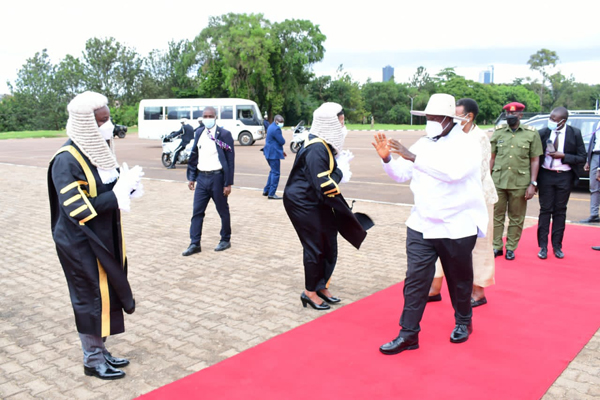State of nation address didn’t tackle challenges

President Museveni welcomed by Parliament Speaker Anita Among and her deputy Thomas Tayebwa ahead of the State of the Nation Address at Kololo on June 7, 2022. PHOTO/HANDOUT
What you need to know:
- The issue: State-of-the- Nation address
- Our view: More than anything, the government comes off as a paternalistic spendthrift if its insistence is that a different set of rules be used.
President Museveni devoted most of his State-of-the Nation address yesterday to the cost of living crisis without directly referring to it. The crisis has undoubtedly taken the wind out of the country’s sails, yet the President believes good times lie ahead.
Mr Museveni yesterday took particular delight in finally meeting the lower-middle income threshold (per capita income of $1039).
Whether such a status quo can be maintained for the requisite stretch of time such that Uganda can dispense with the low income classification rests on a cornerstone of conjecture. What is immediately clear is the fact that yesterday’s State-of-the-Nation address delivered an exceptionally fragile mandate in the pockets of the vast bulk of Ugandans who are scraping along.
As expected, Mr Museveni was relentless in both his advice and criticism. His address was also—predictably—steeped in history.
When he occasionally made exceptions to talk about the here and now, the message was muddled. He gave the assurance that having previously stood foursquare in the vortex of war without ammunition and emerged unscathed, Ugandans should rest assured that the cost of living crisis is not a big deal.
We, however, believe that the cost of living is a big deal. The government cannot whimsically deny its existence. In April, our study revealed that the salaries of up to 94 percent of public servants cannot put three healthy meals on the table for a six-strong family each day.
READ FULL SPEECH: Museveni’s State of the Nation address 2022
If this archetypal public servant listened in to President Museveni’s address yesterday, there are no prizes for guessing as to what their intention was. They were no doubt hoping to learn what the government intends to do to help them outpace the current inflationary pressures’ challenges.
When Mr Museveni started his address with the parable of the wise and the foolish builders, it became distressingly clear his intention was to play a long game. Indeed, the President was very single-minded about how his much-vaunted import substitution strategy (Buy Uganda Build Uganda policy) will eventually ease the pain for people entrusted to his care. He described tax cuts and subsidies—that opposition leader, Mr Robert Kyagulanyi Ssentamu proffered in his own address yesterday—as “traps” and “suicidal.”
There is, however, heavy irony in shrugging such interventions off as consumptive and burdensome to forex reserves and splashing out Shs2.4b on cars for the Speaker and Deputy Speaker. More than anything, the government comes off as a paternalistic spendthrift if its insistence is that a different set of rules be used. This creates a rich dichotomy.
In fact rather than the parable Mr Museveni began with, we reckon Charles Dickens’ A Tale of Two Cities that issues a warning about what happens when wealth funnels upwards while the masses stagnate is apt. To borrow Dickens’ phrase, it is the best of times, it is the worst of times. Nowhere do the best and worst of times collide with such sheer force than in Africa.
Yesterday’s address failed to offer assurances that this is being addressed.




